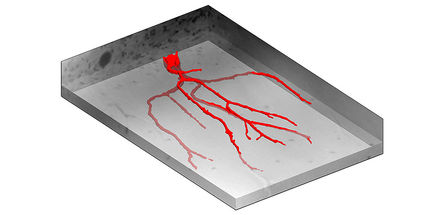An off switch for aggression
Connection between brain regions made visible
Advertisement
Researchers from the Ruhr-Universität Bochum (RUB) and colleagues from Bonn have found a connection in the brain that is crucial for aggressive behavior in mice. The so-called P/Q-type calcium channel, which responds to the neurotransmitter serotonin, is crucial. It has long been known that serotonin plays a key role in emotion regulation. But exactly how aggressive behavior arises has not been understood until now. If the researchers switched off the serotonin-mediated connection between two specific brain regions, the mice behaved less aggressively.

Two authors of the study: Pauline Bohne (left) and Melanie Mark.
© RUB, Marquard
The team led by Pauline Bohne and Prof. Dr. Melanie Mark reports their findings in the Journal of Neuroscience.
Connection between brain regions made visible
The RUB team from the Behavioral Neuroscience group, together with a colleague from the Rheinische Friedrich-Wilhelms-Universität Bonn, investigated a nucleus located deep in the brain, the dorsal raphe nucleus. As the work demonstrated, this nucleus sends nerve fibers that respond to the neurotransmitter serotonin to the ventromedial hypothalamus. The researchers visualized these with green fluorescent tracer substances.
Aggression switched on and off
In further experiments, the researchers removed the P/Q-type calcium channel from the dorsal raphe nucleus in male mice. Brain activity in this nucleus and in the connected ventromedial hypothalamus increased - and so did the animals' aggressive behavior.
Via genetic modification, the researchers then introduced a modified receptor into the cells of the dorsal raphe nucleus of the same animals - as a replacement for the previously removed P/Q-type calcium channel. They were able to inhibit the modified receptor with a chemical molecule not normally found in mice. With the help of this molecule, the researchers were able to slowly downregulate the activity of the modified receptor and thus the activity of the neurons in the dorsal raphe nucleus. In this way, they silenced the serotonin signal that the dorsal raphe nucleus normally sends to the ventromedial hypothalamus. In this way, they tamed the previously aggressive mice, which now behaved normally again.
Aggression as a concomitant of mental illness
"The study proves that the P/Q-type calcium channel plays an important role in the serotonin system for aggression," says Pauline Bohne. "It is thus a potential starting point for treating violent behavior." Aggressive behavior is increasingly observed as a side effect of mental illnesses - such as anxiety disorders, impulse control disorders or childhood bipolar disorder. "People with such disorders who behave aggressively are not only a danger to hospital staff, but also to themselves," says Melanie Mark. "Often, treating the aggression prolongs the hospital stay and also the cost of it."
Note: This article has been translated using a computer system without human intervention. LUMITOS offers these automatic translations to present a wider range of current news. Since this article has been translated with automatic translation, it is possible that it contains errors in vocabulary, syntax or grammar. The original article in German can be found here.


























































